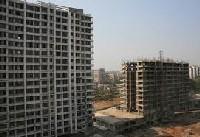 | « Back to article | Print this article |
Amid the perception of gloom and doom in the Indian property market, here's something to cheer about. The real estate industry has given 1.21 times, or 20 per cent, average returns to private equity (PE) investors in the past four years, compared to the global average of 0.8 times. Mumbai and Kolkata, with returns of 1.4 and 1.3 times, respectively, were the top performers, said a report by global property consultant Jones Lang LaSalle (JLL).
Mumbai and Kolkata, with returns of 1.4 and 1.3 times, respectively, were the top performers, said a report by global property consultant Jones Lang LaSalle (JLL).
"A 20 per cent return is a good number, if you look at the property markets between 2008 and 2011, which were not the best of the markets. When the world has not made any money in real estate in the past couple of years, it's time to cheer," said Sunil Rohokale, managing director and chief executive of ASK Investment Holdings, which manages property funds in India.
"When stock markets have lost more than 20 per cent in the past one year, I think returns from real estate are far superior."
JLL chairman Anuj Puri said, "India has given 50 per cent better returns than the global average." He said the reason was land prices in India were going up, while in other countries, these were not.
The Bombay Stock Exchange's Sensex has fallen 23.52 per cent since the beginning of the year, eroding much of investors' wealth.
Property sale registrations have hit a 31-month low in Mumbai due to high realty prices and mortgage rates. Sale registrations for November were down 20 per cent to 4,060 units year-on-year and down 12 per cent month-on-month, according to data culled by equity brokerage Prabhudas Lilladher.
V Hari Krishna, director, Kotak Realty Fund, believes it was just an average of returns made by different investors in real estate.
"A lot of people have lots of money. Many have made a lot of money also. For instance, our returns are way above the 1.2x